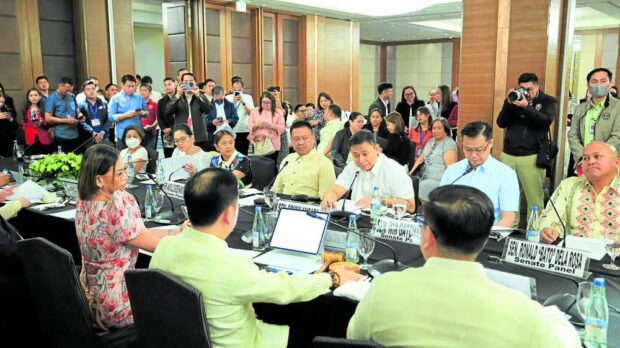Bicam OKs P5.77-trillion budget for 2024; no secret funds for OVP, DepEd

MONEY TALK | The Senate and House of Representatives panels on Monday meet to approve the bicameral conference committee report on the 2024 General Appropriations Bill. The P5.768-trillion national budget, according to the lawmakers, aims to sustain the country’s growth. (Photo from the Senate Public Relations and Information Bureau)
MANILA, Philippines — The bicameral conference committee on Monday approved the final version of the P5.768-trillion national spending program for 2024, which will now be separately ratified by the Senate and the House of Representatives and then sent to President Ferdinand Marcos Jr. for his approval before Congress goes on break on Dec. 15 for the Christmas holidays.
Both the House and Senate panels in the committee did not budge on their earlier decision to strip civilian state agencies of confidential and intelligence funds (CIFs).
This means Vice President Sara Duterte’s offices will not get even a single centavo in secret funds next year. The Office of the Vice President (OVP) and the Department of Education (DepEd), which Duterte heads in a concurrent capacity, had earlier requested P650 million in confidential funds for 2024.
“This is a (national) budget to sustain our (economic) growth and to give our people hope amid these uncertain times,” Sen. Juan Edgardo Angara, chair of the Senate finance committee, told reporters after the committee concluded the budget deliberations at the Makati Shangri-La Hotel.
“The 2024 budget shall devote significant funds for infrastructure, for greater mobility through more roads, bridges, railways, and seaports,” he said later in his sponsorship speech of the General Appropriations Bill.
Article continues after this advertisementThe bicameral panel, however, left the P9.8 billion in CIF of the Office of the President (OP) untouched.
Article continues after this advertisementAs an added safeguard, Angara said the committee adopted Sen. Risa Hontiveros’ proposal to prohibit the OP from using its contingent funds for confidential expenses.
Constitutional challenge
This OP budget item was the source of the contentious P125 million in confidential funds that the OVP spent in just 11 days in December 2022.
On Monday, incumbent and former lawmakers of the progressive Makabayan bloc filed in the Supreme Court a third petition challenging the constitutionality of the fund transfer.
In a petition for certiorari, the Makabayan bloc asked the high court to declare Mr. Marcos’ release and Duterte’s request, receipt, and use of the P125-million confidential funds in 2022 as unconstitutional.
They also asked the high court to declare the money as auditable by the Commission on Audit (COA) in the same manner as it audits public funds and to compel Duterte to return the funds to the national treasury.
Among the petitioners were Gabriela Women’s Rep. Arlene Brosas, ACT Teachers Rep. France Castro, and Kabataan party-list Rep. Raoul Danniel Manuel.
Named respondents in the petition were Duterte, Executive Secretary Lucas Bersamin, Budget Secretary Amenah Pangandaman and COA Chair Gamaliel Cordoba.
“It is unconstitutional for President Marcos to draw from the contingent fund to create confidential funds. Only Congress has the authority to determine who can have access to confidential funds,” Brosas said in a statement.
Two similar petitions were filed in the Supreme Court last month.
The first was on Nov. 7, by legal and economic experts led by former Commission on Elections Commissioner Augusto Lagman and constitutionalist Christian Monsod. The second was filed on Nov. 15 by former Supreme Court Senior Associate Justice Antonio Carpio, lawyer Manuel “Chel” Diokno, and former Sen. Richard Gordon.
‘Sources of corruption’
Ako Bicol Rep. Elizaldy Co, the head of the House contingent, expressed his gratitude to the senators for adopting the changes they made in House Bill No. 8980, which removed the proposed confidential funds of civilian agencies.
“We are pleased that the controversial confidential funds—which are the sources of corruption—were removed for good. We are thankful to our Senate counterparts for supporting the proposal to realign this to government agencies involved in national security,” the House appropriations panel chair said in a statement.
“We’re happy that the entire Senate panel agreed with us and proved that there’s no truth to the speculations that the confidential funds, particularly the DepEd’s, will be given back by the bicameral body,” Co said.
According to Angara, the education sector and infrastructure projects were the biggest recipients of the budget items that were reallocated from other state agencies.
As proposed by Senate President Juan Miguel Zubiri, he said, the Department of National Defense was given an additional P8.4 billion, bringing to P238.4 billion its total appropriation for 2024, and the budget of the Philippine Coast Guard was increased to P29.4 billion after the congressional panel provided an extra P3.6 billion.